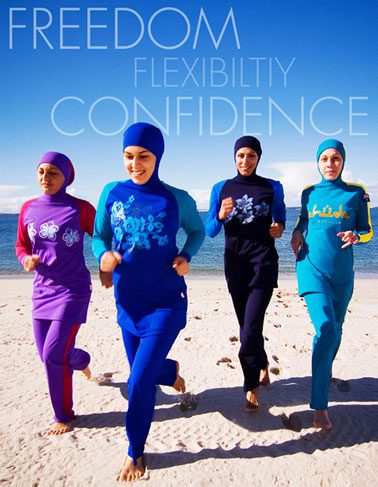
Sunbathing in Alexandria may soon be a thing of the past, at least if some Egyptian Islamist politicians have their way.
“Egypt’s tourism industry has suffered a severe blow since the outburst of anti-regime demonstrations in January,” reports journalist David E. Miller.
Hardliners are demanding that women on Egypt’s beaches wear the “burkini” — which leaves uncovered only the feet, hands and face.
Also under scrutiny are such monuments as the Sphinx. Strict Islam does not allow faces in artwork or sculpture. If new rules are approved, walls in tombs, for example, would have faces covered in wax.
The demands are coming mostly from the “Freedom and Justice Party,” which is the political wing of the Muslim Brotherhood. It is demanding immediate crackdowns on swimwear and tourists’ consumption of alcohol.
“Beach tourism must take the values and norms of our society into account,” Muhammad Saad al-Katatny, secretary-general of Freedom and Justice, told Egyptian tourism officials on Monday. “We must place regulations on tourists wishing to visit Egypt, which we will announce in advance.”
“The call for new strictures on tourists comes as Egypt debates the role of Islam in the post-Mubarak era,” reports Miller for the news site Media Line. “Freedom and Justice is competing in elections scheduled for this autumn for parliament and opinion polls show a majority of Egyptians favor a greater use of Islamic law. But a vocal minority worries that Egypt risks becoming an Islamic republic.”
“This is how things began in Iran,” Hani Henry, a psychology professor at the American University in Cairo, told Miller. “The moderate youth wanted to implement changes, but the mullahs hijacked the revolution. The same thing is now happening here in Egypt with the Muslim Brotherhood. It makes me sick to my stomach.”
Along with Suez Canal tolls and energy exports, tourism is a major source of foreign exchange for Egypt, noted Miller:
But with protests, strikes, and continued violence in the cities and Sinai Peninsula months after President Husni Mubarak was forced to step down, foreigners have hesitated to visit the country, which offers some of the world’s most spectacular antiquities as well as beaches and scuba diving.
Finance Minister Hazem al-Beblawi told the Reuters news agency earlier this month that revenue from tourism would likely total $10 billion in the financial year that started on July 1, compared with $11.6 billion in 2009-10.
Al-Katatny told Egypt’s Al-Masry Al-Youm daily newspaper that his party had already set up a subcommittee to investigate the issue of incoming tourism to Egypt and planned to amend legislation following the upcoming parliamentary elections.
“Some slight changes will be made in public beaches, to make the situation better than it was before,” Ali Khafagy, youth director of Freedom and Justice in Giza, told Miller. “Bathing suits and mixing on the beach are things that go against our tradition. It’s not just a matter of religion. When I go to the beach I don’t want to see nudity.”
He said “modest” bathing gear or separate beaches for men and women are possible alternatives to the current situation.
“Modest” and generally applies only to women. In such countries as Iran, men wear European-style swim briefs while women swim in what is called the “burkini” — covering them from head to toe.
Miller noted:
Khafagy stressed that tourists would be free to do as they please in specially designated areas, adding that his party supported incoming tourism to the country. But that did not satisfy the heads of Egypt’s tourism industry, who met with the party’s secretary-general Al-Katatny for a heated debate.
“Without alcohol and bathing suits, no tourists will come and we will loose $13 billion a year,” Hussam a-Shaer, head of the tourist company association, told Al-Masry al-Youm.
But bathing suits are not the only worry of Egypt’s Islamists. Abd al-Munim a-Shahhat, a spokesman for the Salafi group Dawa, has said that Egypt’s world-renowned pharaonic archeology – its pyramids, Sphinx and other monuments covered with un-Islamic imagery – should also be hidden from the public eye.
“The pharaonic culture is a rotten culture,” a-Shahhat told the London-based Arab daily A-Sharq Al-Awsat, saying the faces of ancient statues “should be covered with wax, since they are religiously forbidden.” He likened the Egyptian relics to the idols which circled the walls of Mecca in pre-Islamic times.


